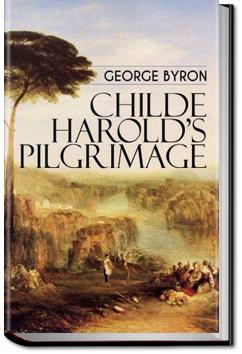UNLIMITED Audiobooks and eBooks
Over 40,000 books & works on all major devices
Get ALL YOU CAN for FREE for 30 days!
Childe Harold's Pilgrimage
Lord Byron
Book Overview:
Childe Harold's Pilgrimage is a lengthy narrative poem in four parts written by Lord Byron.The poem describes the travels and reflections of a world-weary young man who, disillusioned with a life of pleasure and revelry, looks for distraction in foreign lands. In a wider sense, it is an expression of the melancholy and disillusionment felt by a generation weary of the wars of the post-Revolutionary and Napoleonic eras.
Childe Harold's Pilgrimage is a lengthy narrative poem in four parts written by Lord Byron.The poem describes the travels and reflections of a world-weary young man who, disillusioned with a life of pleasure and revelry, looks for distraction in foreign lands. In a wider sense, it is an expression of the melancholy and disillusionment felt by a generation weary of the wars of the post-Revolutionary and Napoleonic eras.
How does All You Can Books work?
All You Can Books gives you UNLIMITED access to over 40,000 Audiobooks, eBooks, and Foreign Language courses. Download as many audiobooks, ebooks, language audio courses, and language e-workbooks as you want during the FREE trial and it's all yours to keep even if you cancel during the FREE trial. The service works on any major device including computers, smartphones, music players, e-readers, and tablets. You can try the service for FREE for 30 days then it's just $19.99 per month after that. So for the price everyone else charges for just 1 book, we offer you UNLIMITED audio books, e-books and language courses to download and enjoy as you please. No restrictions.
LXIII.
Of thee hereafter.—Even amidst my strain I turned aside to pay my homage here; Forgot the land, the sons, the maids of Spain; Her fate, to every free-born bosom dear; And hailed thee, not perchance without a tear. Now to my theme—but from thy holy haunt Let me some remnant, some memorial bear; Yield me one leaf of Daphne's deathless plant, Nor let thy votary's hope be deemed an idle vaunt.LXIV.
But ne'er didst thou, fair mount, when Greece was young, See round thy giant base a brighter choir; Nor e'er did Delphi, when her priestess sung The Pythian hymn with more th. . . Read MoreTry now for FREE!

"Love your service - thanks so much for what you do!"
- Customer Cathryn Mazer
"I did not realize that you would have so many audio books I would enjoy"
- Customer Sharon Morrison
"For all my fellow Audio Book & E-Book regulars:
This is about as close to nirvana as I have found!"
- Twitter post from @bobbyekat



Community Reviews
This was the poem that set Byron on his meteoric course as Don Juan bursting into formal Napoleonic London society like a guided missile. Everyone was reading it, from literate serving girls and parlour maids to the top nobs. It's difficult to believe these days that it sent women into fainting fits
This is my favorite work by Lord Byron. Hands down. No contest. I revisit it often to read favorite sections.
Via the character of Childe Harold, and later simply as himself, Byron explores the world. He visits places like Spain, Turkey, and of course, Greece. He also muses on great historical figur
Lately I've being reading around Frankenstein, so Byron, who was at Lake Geneva that fateful summer when Mary Shelley began writing her masterpiece, couldn't be excluded. The parts of Byron's pilgrimage spent in solitude and melancholy on mountaintops are often quite brilliant:
To fly from, need not
Please scroll down for the English version.
A csillagozás a szokásos átlagolásom eredménye: a megírás minősége öt csillag, az élmény három.
Két okból fogtam bele.
Gimnazista-egyetemista koromban nemcsak tetszett, hanem nagyon komoly hatással is volt rám az angol romantika irodalma. Nem túlzás azt áll
It's not a breeze to read this if you live in our century. People who went mad for Byron two hundred years ago read long-form poetry, the Bible, Latin, and Greek as a matter of course--that's what it meant to read. They sat in church a lot. Four references to mythological heroes/Roman history/Italia
""For who would trust the seeming sighs
Of wife or paramour?
Fresh feeres will dry the bright blue eyes
We late saw streaming o'er.
For pleasures past I do not grieve,
Nor perils gathering near;
My greatest grief is that I leave
No thing that claims a tear."
For a poem with a reputation for crass "emo-n
Childe Harold may be the epitome of romanticism, but also of how poorly romanticism has aged. The concept of the work is fascinating-- a travelogue in the form of Spencerian epic verse. Byron's prose endnotes often read more like standard travel writing, and contain some wonderful anecdotes such as
Like many literature students, I first encountered Childe Harold in a shortened version. In 2010 I read the last two cantos and I really didn't like it. I still think it is easy to get lost in the language and it is difficult understand what Byron is trying to say, even going over the last two canto